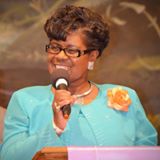 About Shirley McFarlin
About Shirley McFarlin
Shirley McFarlin is part of James McFarlin Community Development, Inc., a nonprofit organization that provides charity for individuals and families as well as resources for community development in Edgecombe and Nash counties. They are community partners and they serve and collaborate with UNC and Project Momentum and OIC in various projects that they undertake. If JMCD is not on the front-line of participation we may have a site that has available space and would help.
Shirley McFarlin has been apart of Project GRACE for about 6 years. She became involved due to a conversation with Angela Bryant. Shirley McFarlin used to work at Nash hospital in Rocky Mount and was doing some work with the staff. Angela Bryant started to share with her about community opportunities and about Project GRACE. McFarlin says, “if my memory serves me correctly she has been part of its inception, and she had such great things to say, and she would say “Shirley you need to step into this realm and become a part of it.” She believes there are many individuals in the northern part of the area who have not had an opportunity to participate and so with Angela Bryant’s encouragement:
“Everyone has been so welcoming and so patient with this old lady, and so I just feel blessed when I think about how it has come to be and how I did cease that moment, I did not allow that opportunity to pass me by.”
Growing Up
“Why is it important to work in a rural community?”
Shirley McFarlin talked about her experience growing up and her relation to rural communities and the obstacles that are faced. She said this, “It’s important to me because that’s where I grew up, on the dirt road. The out house about 2- 3 miles from the main house and I remember what a struggle it was for my family. I also remember how difficult it was when there were large families. Everyone was out there in the cotton field picking cotton and shaking peanuts and all these kinds of things that we had to do to survive, but thankfully we were able to do that. And now, it’s a different time for us now, my son wouldn’t have a clue going out there and picking some cotton out of the boes. But when I think about it, my hands still burn every time I would wash them after picking cotton. So the individuals who are not necessarily still in that phase, but yet. still struggling, it just does my heart good to be able to share with them and to encourage them, and to be able to say I’ve been there and I’ve done that so I know just how difficult it can be. It just causes my heart to rejoice when we can bring something to our rural communities too, to let them be reminded that there still is hope, no matter what we face.”
